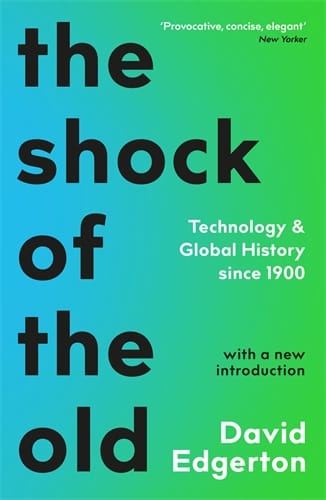week 28 / 2025: the concretisation of metaphor
The tools of science fiction can be put to use in the storying of scenarios, but in such cases, they are means to a somewhat different end. How might we usefully describe that distinction?

“I walk on concrete, I walk on sand / but I can't find a WEEKNOTES to stand...”
This week I have been trying to articulate the difference between science fiction per se and the sort of work I do when I make fictions from futures scenarios. I think I’ve got my finger on it, but it’s tricky to define in a way that’s satisfactory. Nonetheless, I’m going to throw up what I’ve got so far, and see if it lands with any of you.
It will help if we work with an example, here, so let’s take the bundle of ideas that goes under the label “more-then-human”. One could all too easily spend several thousand words on trying to unpack that concept, but for the sake of brevity—and with apologies to any theorists reading this post—let’s just say that the core idea is that, ideally, human decision-making processes should incorporate the perspectives of living things other than human beings. (Yes, the word “living” is doing a whole bunch of very contestable work, there. Let’s set that aside for now.)
One of the more common figurations for this idea is some sort of human-animal deliberatory body—a parliament, perhaps. Now, let’s note that this is a future, albeit a very loose and top-level one: it’s a description of a social arrangement that does not currently pertain. It’s also an abstraction, an idealised summary of a whole bunch of very complex ideas and debates.
When a science fiction writer works with an idea like this, they use a technique that is sometimes referred to as the concretisation of metaphor. The core idea is [political deliberation that includes both humans and animals]; the metaphor is an image cobbled together from the store-house of existing ideas that can express that idea as an image, namely [human-animal parliament]. To concretise a metaphor is to treat it literally. Therefore a science fiction author working with this idea might depict an actual parliament in which humans and animals are able to debate law and policy on a mostly equal footing.
It goes without saying that there are significant obstacles to establishing such a deliberatory body! This is where the core device of utopia comes in to play: by displacing the idea in either space (i.e. setting it on another planet) or time (at some point in the far future, say) or some combination of the two, the writer gains the imaginative space to explain away the obstacles; perhaps they will suggest that neural interfaces have been developed, which allow for the direct and instantaneous translation of animal cognition into human language, and vice versa.
What our hypothetical author is doing here is taking the complex philosophical issue of human-animal relations, and using as-yet wholly imaginary technological speculation to create a situation in which that abstract idea is made concrete within the space of the story. This is a fine thing, to be clear—it’s one of the delights of sf as a genre, particularly for this reader! But it’s important to note that there’s a double movement happening here: yes, the storying of the idea concretises it, but that which is being concretised is already a metaphor, which is to say an abstraction. This is why some scholars argue that sf bears close relation to myth, and/or to allegory; it is neither of those things, but it works in similar ways.
Now, if I am asked to take a futures scenario that posits more-than-human relations and make a story of it, I am being asked to concretise that idea, but not in the same way described above. This distinction is to do with the telos, with the purpose of the exercise.
A science fiction story’s first purpose is to entertain; it’s quite a particular sort of entertainment, one that derives its pleasure from the concretisation of metaphor to create cognitive dissonance, an imaginative experience of alterity. But science fiction is not propositional in the way that futures work is propositional. Yes, it proposes a thought experiment, and there may be a more or less philosophical impetus to that thought experiment—the author may want us to consider, in the case of our human-animal parliament, the ethics of human action. But for the most part, the author is not proposing that we try to actualise the metaphor they have concretised.
With notable exceptions, writers of sf are usually first in the queue to proclaim that what they do is not meant as prediction, prophecy or proposal: we readers are not meant to take these ideas literally! But perhaps the confusion is somewhat inevitable: after all, the story is taking the idea very literally indeed. (Maybe that’s why we live in a world where wealthy, powerful business leaders keep striving to deliver the torment nexus?) To put it another way, our technologist overlords keep trying to backcast from futures which were not being put forward for that purpose.
But when I’m making a story from a scenario, I am working on the assumption that the scenario is a propositional future, at least to some degree. It may not be a future that’s being proposed as desirable, of course; it may not even be plausible, though they are almost always meant to be possible. Which means I’m doing something that bears relation to backcasting, in that I’m trying to take the idea of [human-animal parliament] and ask what that, or the closet possible approximation thereof, might actually look like within the timeframe constraints I’ve been given to work with.
So I too am taking a metaphor and making it concrete—but I am not concretising the metaphor; I am not taking the metaphor literally, as a work of science fiction might do. This is because the parameters of the job mostly preclude the utopian displacement: I can’t do an Adrian Tchaikovsky (much as I'd like to!) and put this parliament on some alien planet far in the future. Instead, I’ve got to put it (for example) somewhere on earth in the next ten or fifteen years. Which in turn means I don’t get to posit the neural cognitive-translation rigs that might make the concretised metaphor possible; an actual human-animal parliament is off the menu. My job is to translate the metaphor back into the terms of a world that might reasonably be believed to exist in a decade or two from now.
So this is where I’m stuck, because there are two different sorts of concretisation here: the sf-nal mode of concretisation, which takes the metaphor literally, and the fiction-for-futures mode, which acknowledges the metaphor as a metaphor and (re)concretises the idea within the image, rather than the image itself. There’s a clear distinction here, but I’m struggling to express it clearly, you know?
I will close by noting that this fiction-for-futures process can sometimes disappoint the people who worked on the scenario, because it’s kinda deflationary. We’ve become very accustomed to sf-style concretised metaphors as a regular feature of our discourse around futurity, and even those of us who don’t want the torment nexus may nonetheless be quite enamoured of the human-animal parliament; being told “well, it’s really not gonna happen quite like that” can be a painful thing.
But that pain is, I think, part of the value of the fiction-for-futures mode, because it brings the imagination back from the playground of abstraction and confronts it with the concrete obstacles to the core idea—and that is where the work of realising the futures we actually want has to take place. Yes, we need visions to steer toward (and/or away from): we need destinations marked on our map. But having looked to the horizon and decided on our direction of travel, we have to then return our eyes to the territory, to the actual terrain beneath our feet, and decide how best to go in the chosen direction given the opportunities and obstacles in front of us.
Indeed, I think this is this is particularly valuable with idealistic theories like “more-than-human”, because there’s a tendency to forget that they were always already a metaphor. The indigenous peoples who inspired these theoretical positions have never literally sat down and asked the crows and coyotes where the new village should go; rather, they have made sincere attempts, based on experiential knowledge and observation, to think and speak on behalf of those other beings. But that’s a whole other topic—not to mention a big ol’ can of worms—so let’s leave it here for now.
reading
I have added David Edgerton’s The Shock of the Old to the fairly extensive list of books that, had I been aware of them at the time, might have reduced the length of my doctoral dissertation by several pages. I’m genuinely amazed I missed it, as it was apparently a big influence on The Maintainers, of whom I was well aware… but, well, it happens. Better late than never.

In actual fact, perhaps better now than then—because Shock… turns out to be a hugely valuable book in the context of PROJECT PORTON, and for much the same reasons as it would have been helpful during my doctorate: it’s a good strong plank of argument to build into the base of my own edifice. Put very briefly, that argument is that almost everything we think we know about progress, about innovation, technological succession and diffusion, technology transfer, and about the relation of technology to economic outcomes, is utter tosh. Not only that, Edgerton has gone and found the numbers that undermine these narratives, whose prevalence he blames (not entirely unreasonably) on “futurology”, as well as perverse incentives.
In the 2019 edition, Edgerton has included a foreword that makes another really useful point, namely that talking about “technology” as if it’s a meaningful category is a big part of the problem; he even takes himself to task for having overused it in the book, where he should have relied instead on the (also vague, but provocatively and hence productively so) “things”.
It’s not beautifully written, though it’s more than passable by the standards of academic history-of-technology writing. The point becomes a bit laboured toward the end; in truth, I’d probably gotten 90% of its value to me by the end of the first couple of chapters. But it’s not a big book, despite dealing with a very big idea—and if you spend any time whatsoever thinking about futures and sociotechnical change, professionally or otherwise, you really owe it to yourself to let Edgerton kick out some of the props of your thinking.
a clipping
The NYRB has a long review of a couple of Kohei Saito’s recent degrowth books, plus a recent Verso publication by one Matthew T Huber on “climate change as class war”, which—on the basis of this review, at any rate—sounds like that venerable publishing house being caught in an act of auto-parody.
Like a lot of writing on degrowth from outside the scene, this piece spends some time building up the case against it, though it does give Saito’s ideas some reasonable amount of space. Having Huber as a foil actually does Saito a favour; much as degrowth is accused elsewhere in the piece as being “a slogan in search of a program”, Huber’s own program doesn’t seem to have moved on much from Lenin and Trotsky, apart from the addition of some speculative technologies (e.g. “carbon capture”) which neither of those two gentlemen lived long enough to hear about.
That said, we do get a very standard line of degrowth critique at the end of this paragraph (my emphasis):
Degrowth hardly stands or falls on Marx’s proleptic endorsement, but returning to Marx gives Saito a chance to underscore perhaps his most important claim: It is possible to devise systems of small-scale, collective resource management that expand social wealth and personal freedom while lessening our demands on the earth. This will be a difficult position for even the most sympathetic readers to fully endorse. Our world is so urbanized, globalized, and developed—the vast majority of people in the US and Japan live in cities and depend on transoceanic supply chains for basic necessities—that it is difficult to picture the transformations Saito proposes without some apocalyptic event.
*looks out of window at the weather* Hmm, wherever might such a disastrous trigger come from? One can hardly imagine etc. etc.
And then there’s this:
Indeed, Slow Down’s principal weakness, shared with many degrowth proposals, is that it spends too little time spelling out what such a radically different system would look like, how it would work, and what it would take to move from today’s deeply entrenched global capitalism to something like its opposite.
Again, I’ve heard this a lot, but I’m increasingly convinced it may actually be degrowth’s greatest strength. Huber’s bloviations seem to indicate the extent to which the tail-chasing paradigm of “solutions” has captured both sides of the political fence—he should read The Shock of the Old, really. And therefore credit is due to Saito for refusing to package degrowth neatly into a “program”, presumably because he’s smart enough to see that thinking in terms of programs is exactly the mindset that dug us into this hole, as well as courageous enough not to pretend that somehow digging upwards might get us back out of it.
ticked off
- Sixteen and a half hours on PROJECT PONTIF. (Full steam ahead, no messing.)
- Nine hours of admyn. (Meetings, book-keeping, emails, all that stuff.)
- Six and a half hours on PROJECT VIENNETTA. (Returning to the latest batch of stories to edit. I used to hate having to come back to fiction after leaving it fallow for a few weeks, but the more I do it, the more helpful it becomes.)
- Three hours on PROJECT PORTON. (Bits and piece; this’ll be back in the frame a bit next week, I think.)
- Ten hours of undirected writing and reading.
Also got to add a new codename to the imaginary whiteboard this week: look out for PROJECT FLATPACK later in the season.
OK, that’s all for this week. Let me know your thoughts on concretised metaphors and/or degrowth, if you like? Either which way, I hope all’s well with you.
This has been the Worldbuilding Agency weeknotes for Week 28 of 2025. Thanks for reading! If you've enjoyed them, it's free to subscribe. If you are already subscribed, please send to a friend who you think might also like it!





Comments ()